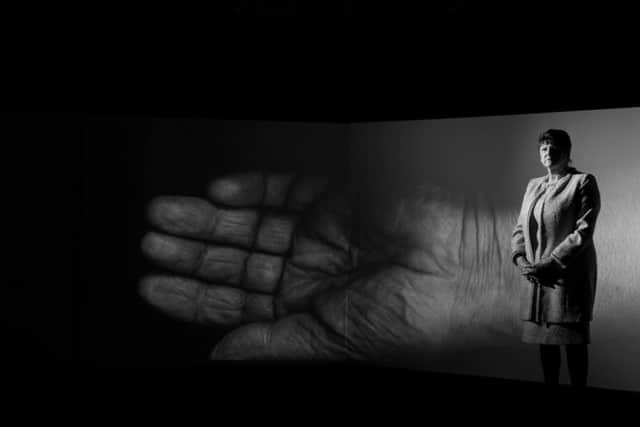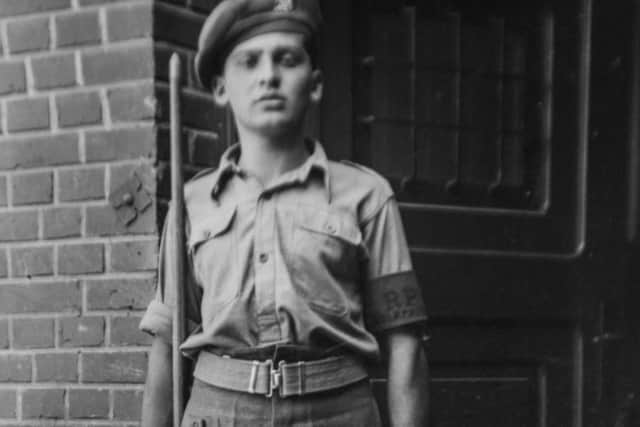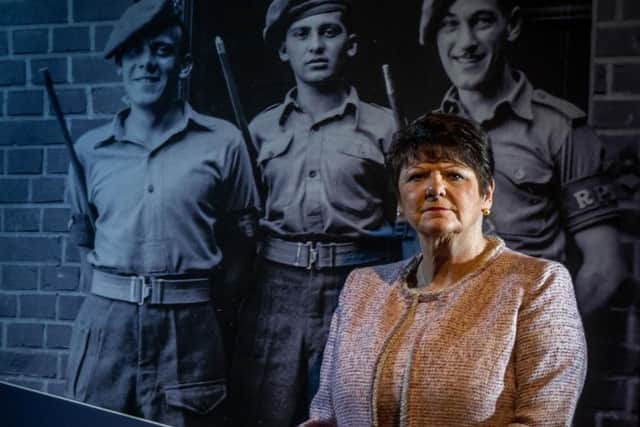The shadow of hatred - Survivor's daughter explains why we must always remember the Holocaust
“It’s so important to always remember, live and let live,” read his words on the reverse.
The image was taken in Germany in 1948, three years after the end of the Second World War. He had survived the horrors of the Holocaust but his life had changed beyond recognition.
Advertisement
Hide AdAdvertisement
Hide Ad“I can’t say he was ever reconciled to his past,” Lilian tells me. “I think any survivor of any sort, whether it is a camp survivor or someone who was in the ghetto, their experience is something they learn to live with to a better-or-worse extent. But the wounds are there forever.


“I don’t call them scars because a scar is something that’s mending. These are wounds that are deep within people and can never be removed.”
We are speaking at the Holocaust Exhibition and Learning Centre in Huddersfield, opened in 2018 by the Leeds-based Holocaust Survivors’ Friendship Association.
Escaping the Holocaust: One Yorkshire woman’s amazing storyFormed in 1996, the group has shared members’ most harrowing and distressing experiences with tens of thousands of people, their aim to educate about the dangers of intolerance and the ease with which prejudice can lead to genocide.
Advertisement
Hide AdAdvertisement
Hide Ad“If you look at some of the very nasty rhetoric that is about at the moment and you go to the beginning of the exhibition, you can see parallels,” says Lilian, who chairs the association.


“It’s the beginning of the undermining of human values – and that’s how it began in Germany.
“You can see resonances in social media and the way people communicate with each other today. You can see a degree of normalisation of what I think is frankly racist and xenophobic behaviour.”
We are speaking in advance of Holocaust Memorial Day on Monday, a date dedicated to the remembrance of the six million Jewish men, women and children murdered during the Holocaust, alongside the millions of other people killed under Nazi persecution and in subsequent genocides.
Advertisement
Hide AdAdvertisement
Hide AdThis year, it also marks the 75th anniversary of the liberation of Auschwitz-Birkenau, the concentration and extermination camp where Eugene was held.


“Remembrance for us is everyday,” says Lilian. “This is part of our DNA in a way. “But the 75th anniversary is a key point where the living legacy is not going to be with us for very much longer and this is an occasion in the year where people not normally touched necessarily by the Holocaust can focus their attention on reflection as to how this happened.
“The message of another survivor, our life president Heinz Skyte, who sadly recently died, was always ‘be alert’. I think by a deeper understanding of how this happened, it alerts us to how by not accepting each other, we can move from scapegoating, stereotyping and pointing a finger at the other who is different, to genocide.”
Lilian’s father was born into a Jewish family in 1928 and was on the first Hungarian transport into Birkenau in 1944. He was just 16. In May that year he had returned home from school to find his family on board a German military lorry outside. He was immediately ordered on to it.
Advertisement
Hide AdAdvertisement
Hide AdAfter being driven to a nearby brickyard, the family were forced on to railway cattle trucks and taken to Auschwitz-Birkenau. There he was given a number – 55546 – shaved of his hair and separated first from his mother and sisters and then from his father. He never saw them again.
Eugene remained at the camp for around 10 days before being selected for forced labour and sent by train to Mittelbau-Dora, a concentration camp in the Harz mountains. His job was to load small trucks with rocks dug from underground tunnels, working up to 14 hours at a time and living on starvation rations.
“I never thought that one day we would be free,” he is recorded as saying in video testimony made before his death in 2016. “I thought that there would be no survival and people would perish through lack of food and the conditions or we would be killed eventually.”
In March 1945, Eugene was sent to Bergen Belsen, a camp he described as “a hellhole”. It was from there he was liberated with the arrival of the British Army on April 15.
Advertisement
Hide AdAdvertisement
Hide Ad“That last week, they had no food, no water, nothing,” Lilian says. “They were just lying there. He describes in his testimony that they were eating grass, but then there was no grass.
“I think if the British Army had not liberated them when they did, he would definitely have perished.”
Yorkshire Holocaust survivors open £1m education centre to teach next generation about horrors they enduredHer father’s story is one of 16 experiences documented in the permanent Through Our Eyes exhibition at the centre, which has had around 10,000 visitors since its opening.
His face sits alongside photographs of each of those included –Leisel Carter, a four-year-old girl sent across Europe to find sanctuary, first in Norway and then eventually in Leeds, with just a teddy bear to keep her company; Martin Kapel, whose mother secured him a place aboard the Kindertransport, a rescue programme that took children to Britain from Germany, Austria and Czechoslovakia; Suzanne Rappoport-Ripton, one of an estimated 300,000 Hidden Children, who lost their families to the Nazis and were taken into the care of a network of gentile families throughout France. And the horror goes on.
Advertisement
Hide AdAdvertisement
Hide AdEach is a tale of fear, upheaval and discrimination, their stories reflecting the differing and devastating impact of the Nazi regime, from the ghettos to the camps and those who left everything in a desperate attempt to flee to safety.
All those included were children and young people when, in the 1930s and 40s, they made new lives in the North of England as either refugees or survivors of the Holocaust. Eugene moved over in 1949.
After liberation, he was befriended by a medical officer in the British army and became an interpreter in Sennelager. There he met his future wife Annie, a young English woman who was working with the force.
On his move to the UK, that same army medic introduced him to Marks & Spencer, where he spent his working life. But like many of the survivors, he never spoke about his past.
Advertisement
Hide AdAdvertisement
Hide AdHe opened up for the first time in testimony for the Shoah Foundation, an organisation that documents interviews with Holocaust survivors and witnesses, and only gave his first public speech in the year 2000. Five years later, he returned to Germany for the first time to mark the 60th anniversary of the liberation of Bergen Belsen.
“It was my mother really, who wanted to keep the camps out of the house,” says Lilian. “It’s very difficult, certainly among survivor families – how do you tell your children about something so horrendous? It was a silence, a heavy silence about something that was awful.”
Why I stand with Sacha Baron Cohen, David Baddiel and Michael Rosen and why Holocaust denial must be challenged - Anthony ClavaneTo mark Holocaust Memorial Day, a selection of the centre’s survivor tales, including her father’s, have been displayed in a photographic exhibition at Leeds Town Hall. The day’s theme this year is ‘stand together’ – a message of tolerance consistent with Eugene’s words on the back of that leaflet.
“To me that theme means that we are all, whoever we are, standing together to live together peacefully and to create a society that understands and accepts each other as human beings, treating each other with respect,” Lilian says. “Nobody should be at the end of any form of persecution or discrimination.”
Advertisement
Hide AdAdvertisement
Hide AdWe Were There runs at Leeds Town Hall till February 29, courtesy of the Holocaust Survivors’ Friendship Association. A Holocaust commemoration takes place at the centre in Huddersfield on Monday from 6pm.